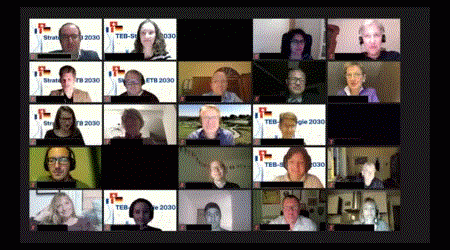How can citizens be integrated in decision making for the improvement of their daily lives? Civil Engagement for operational and strategic planning!
Since its inception, European Cross-Border Cooperation has been employed within the European Union to capitalize on opportunities and overcome challenges in border regions. These efforts aim to improve the daily lives of citizens in various areas, such as employment, education, transportation, and the environment. An important question naturally arises: How can the design and implementation of these cooperative efforts be informed by, and take into serious consideration, the opinions and experiences of the actual citizens they will affect? Civic engagement plays a pivotal role in EU policy, and in this article, we are exploring one such successful initiative - the Civic Dialogue designed and implemented by the Trinational Eurodistrict Basel (TEB).
Who?
TEB encompasses three countries: France, Germany, and Switzerland. It is an organization of municipalities and cities in the trinational vicinity of Basel, a densely populated area with around 1,000,000 residents. TEB was one of the first Eurodistricts to be officially established in 2007, following a long history of cooperation.
What?
The Civic Dialogue was an initiative that aims to create a platform for people living in border regions to engage in discussions and share their views on various topics related to cross-border cooperation. Additionally, the initiative aims to also standardize the process of integrating citizen feedback into the operational and strategic planning of structures of cross border cooperation. This was achieved through the engagement of citizens in the drafting and formulation of the Eurodistrict’s 2030 strategy.
How?
The project was coordinated by TEB, in collaboration with local authorities and civil society organizations. Participants included young people, senior citizens, and representatives from diverse professional and social backgrounds, all living in border regions. The final participants were selected through a process that ensured a diverse composition while also being random. These individuals were invited to join online sessions. The Trinational Civic Dialogue was conducted through a series of online meetings and workshops, where participants attended virtual workshops to discuss specific topics in small groups. These workshops enabled them to exchange views on how cross-border cooperation could be improved to address common challenges and create new opportunities for the region's citizens. Beyond the workshops, online questionnaires directed at citizens were launched that contributed by making sure that feedback and proposals were gathered from the greatest number of citizens possible. The initiative produced a series of concrete policy and strategic recommendations and proposals for the future of the border region.
Results
The first Trinational Civic Dialogue resulted in several key insights and recommendations across the five focus areas:
Environment and Climate: Participants called for increased cooperation in developing sustainable practices and policies, as well as promoting green technologies and renewable energy sources.
Mobility and Transport: Improved public transportation and infrastructure were highlighted as essential, along with the promotion of sustainable mobility solutions.
Culture and Leisure: Participants proposed the creation of a trinational cultural calendar and the establishment of cross-border cultural institutions to promote exchange and understanding.
Work and Training: Greater cooperation in education, training, and employment opportunities was suggested, including joint educational programs, vocational training initiatives, and job fairs.
Health and Social Issues: Collaboration in addressing health and social issues was emphasized, with calls for joint efforts in developing innovative solutions, such as telemedicine and cross-border healthcare facilities.
Education & Plurilingualism: More exchanges between pupils, Institutionalized school partnerships, daily use of all other languages
The Eurodistrict Basel Trinational Civic Dialogue serves as a model for citizen participation in cross-border cooperation, emphasizing the importance of involving citizens in the decision-making process and promoting transparency, accountability, and mutual understanding among different communities.
If you want to know more about this or other civic engagement good practices in the case of the Trinational Eurodistrict Basel follow this link

- Prihlásiť sa na účely uverejňovania komentárov

